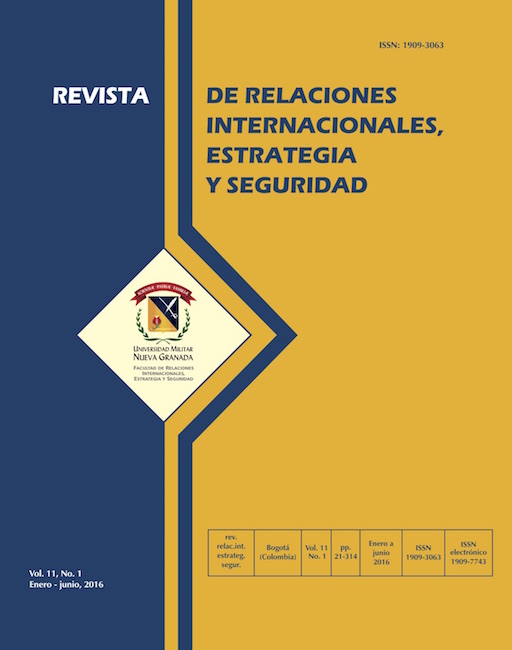The International Relations theory under a feminist approach
Abstract
The sociological logic of the study of international relations is based on the recognition of the asymmetrical relations of power, from his performing, like realism and neorealism theories arise from there, and this tradition coincides with the development of visions of the study of gender and feminism, where the epistemological principle are similarly asymmetric relations between men and women both in their roles, social, cultural, economic, political, etc. Indeed, feminist approaches to International Relations have introduced gender as an essential tool for analyzing the interactions between states in the international framework. However, in spite of these efforts to construct a better International Relations Theory, feminist analysis has had little impact on international politics. The aim of this essay is to analyze the value in adopting a feminist perspective on International Relations.Downloads
Languages:
enReferences
Acker, J. (2000). Hierarchies, jobs, bodies: a theory of gendered organizations. Gender and Society. 139-158.
Allen, A. (1998). Rethinking power. Hypatia. 21-40. http://dx.doi.org/10.1111/j.1527-2001.1998.tb01350.x
Brown, S. (1998). Feminist International theory and international relations of gender inequality in millennium. Journal of International Studies. 461-475.
Byron, J. & Thorburn, J. (1998). Gender and international relations: A global perspective and issues for the Caribbean. Feminist Review. 211-232 http://dx.doi.org/10.1080/014177898339532
Cockburn, C. (1991). In the way of women: men's resistance to sex equality in organizations. London: Zed Books. http://dx.doi.org/10.1007/978-1-349-21571-3
Enloe, C. (1990). Bananas, Beaches and Bases: Making Feminist Sense of International Politics. Berkeley: University of California Press.
Enloe, C. (1993). Bananas, Beaches and Bases. In Kaufman, L. American Feminist Thought at Century's End: A reader. (pp. 441-464). Cambrigde: Blackwell.
Grant, R. & Newland, K. (Ed.) (1991). Gender and International Relations. Indiana: Indiana University Press.
Hutchings, K. (1999). International Political Theory. London: SAGE Publications. http://dx.doi.org/10.1038/23680
Ingham, B. (1995). Economics and Development. England: McGraw-Hill Book Company.
Jones, A. (1996). Does gender make the world go round? Feminist critiques of International Relations. Review of International Studies. 405-429. http://dx.doi.org/10.1017/S0260210500118649
Kardam, N. (1991). Bringing Women in: Women's Issues in International Development Program. London: Reinner Publishers.
Kofman, E. & Youngs, G. (2008). Globalization Theory and Practice. New York: Pinter Dub.
Logan, M. & Huntley, H. (2001). Gender and power in the research process. Women's Studies International Forum. 13. 623-635. doi: 10.1016/S0277-5395(01)00204-7 http://dx.doi.org/10.1016/S0277-5395(01)00204-7
Nicolás, M. (2005). Resistencias teóricas y prácticas a la integración de la metodología feminista en la disciplina de Relaciones Internacionales. Revista Académica de Relaciones Internacionales. 2. 1-16. http://www.relacionesinternacionales.info/ojs/article/view/186/171.html
Peterson, S. (1992). Gender State: Feminist Revision of International Relations Theory. Boulder: Lynne Rienner.
Peterson, S. (1992). Gender State: Feminist Revision of International Relations Theory. Boulder: Lynne Rienner.
Pettman, J. (2001). Gender Issues. In. Baylis, J.; Smith, S. & Owens, P. The Globalization of World Politics. An introduction of international relations. (258-273). London: Oxford University Press.
Randal, V. (1982). Women and Politics. Great Britain: Macmillan. http://dx.doi.org/10.1007/978-1-349-16880-4
Rosenau, J. (1982). Women leaders and foreing policy options. In Boneparth, E. Women, Power and Policy. (p. 336). New York: Pergamon Press.
Runyan, A. & Peterson, S. (1991). The Radical Future of Realism: Feminist Subversion of IR Theory. Alternatives. 16(1). 67-106. http://dx.doi.org/10.1177/030437549101600103
Sylvester, C. (1994). Feminist Theory and International Relations in a Post Moder Era. Cambridge: Cambridge University Press.
Tickner, A. (1997). You just don't understand: Troubled engagements between feminist and ir theorists. International Studies Quarterly. 41(4). 611-632. http://dx.doi.org/10.1111/1468-2478.00060
Tickner, A. (2005). What is your research program? Some feminist answers to international relations methodological questions. International Studies Quarterly. 49(1). 1-21. http://dx.doi.org/10.1111/j.0020-8833.2005.00332.x
Tickner, A. (1992). Gender in International Relations, Femenist Perspective on Achieving Global Security. New York: Columbia University Press.
Todaro, M. (2000). Economic Development. England: Addison-Wesley.
True, J. (2001). Feminism. In. Burchill, S. & Linklater, A. (Ed.), Theories of International Relations. (pp. 241-265). New York: Palgrave.
Whitworth, S. (2001). The practice, and praxis of femenist research in international relationships. In. Jones, R. (Ed.). Critical Theory and World Politics. (pp. 149-160). Boulder: Lynne Rienner Publishers.
Zalewsky, M. (1995). Well, what is the feminist perspective on Bosnia? International Affairs. 71(2). 339-356. http://dx.doi.org/10.2307/2623438
| Article metrics | |
|---|---|
| Abstract views | |
| Galley vies | |
| PDF Views | |
| HTML views | |
| Other views | |












